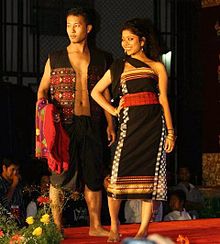Thadou people, also called Thadou Kukis, are the Thadou language-speaking Kuki people inhabiting Northeast India, Burma, Bangladesh. "Thadou" is also the name of a particular clan among the Thadou Kukis. Other clans include Haokip, Kipgen, Doungel, Hangshing, Mangvung etc.[2][3][4]
 Thadou man and woman in traditional dress | |
| Total population | |
|---|---|
| 229,000–313,000 in India[1] | |
| Regions with significant populations | |
| India, Myanmar and Bangladesh | Manipur, Nagaland, Assam, Mizoram, Tripura |
| Languages | |
| Thadou | |
| Religion | |
| Predominantly Protestantism (Baptist) and Catholicism; very small minority Judaism (Bnei Menashe) | |
| Related ethnic groups | |
| Zo people · Chin · Kuki · Mara · Bnei Menashe, Ranglong · Mizo | |
Distribution
editAccording to the 2011 census of India, there are 229,340 Thadou language-speakers in the country. The vast majority of them (97.6%) are in the state of Manipur.[5] Within Manipur, they make up the largest single tribe, forming about 19% of all its Scheduled Tribes.[6] There are also significant numbers of Thadou-speakers in Meghalaya and Assam.[5]
In addition, many Thadou language-speakers are also believed to list their language as "Kuki" in the census.[7] The 2011 census lists 83,968 "Kuki" language-speakers, who are mostly distributed in the states of Nagaland, Manipur and Assam.[8]
References
edit- ^ Census of India, Language (2018), pp. 40, 48.
- ^ Shaw, William (1929), Notes on the Thadou Kukis, Government of Assam – via archive.org
- ^ Seilen Haokip, What Price, Twenty Years of Peace (2012), p. 95.
- ^ Ngamkhohao Haokip, Politics of Tribe Identity (2012).
- ^ a b Census of India, Language (2018), p. 48.
- ^ Michaud, Jean; Swain, Margaret Byrne; Barkataki-Ruscheweyh, Meenaxi (2016), Historical Dictionary of the Peoples of the Southeast Asian Massif (2nd ed.), Rowman & Littlefield, p. 244, ISBN 9781442272798
- ^ Ngamkhohao Haokip, Politics of Tribe Identity (2012), pp. 67–68.
- ^ Census of India, Language (2018), p. 40.
Bibliography
edit- Language: India, States and Union Territories (Table C-16) (PDF), Registrar General of India, 2018
- Haokip, Seilen (2012), "What Price, Twenty Years of Peace in Mizoram (1986–2006): A Kuki Perspective", in Thongkholal Haokip (ed.), The Kukis of Northeast India: Politics and Culture, Bookwell, pp. 89–, ISBN 9789380574448
- Haokip, Ngamkhohao (2012), "Politics of Tribe Identity with reference to the Kukis", Journal of North East India Studies, 2 (2): 64–73 – via academia.edu
- Lieut. R. Stewart in the Journal of the Asiatic Society of Bengal (1857). entitled "A slight notice of the Grammar of Thadou or New Kookie language."
External links
edit- www
.ethnologue .com /language /tcz - The Thadous at the Wayback Machine (archived December 2, 2021)
- thadoubaptistassociation
.org /en /home